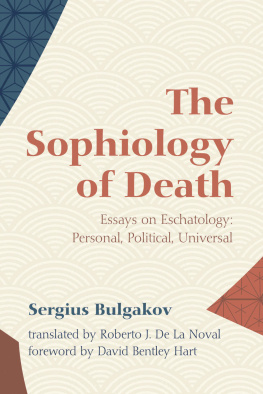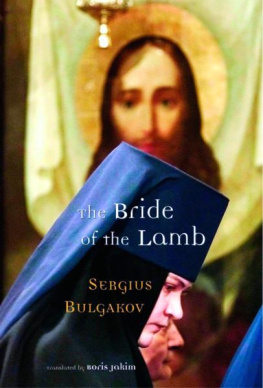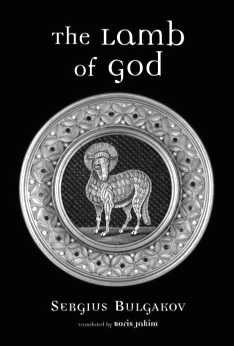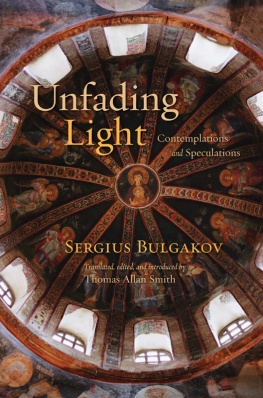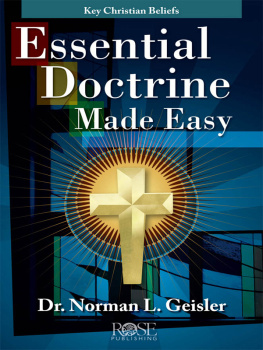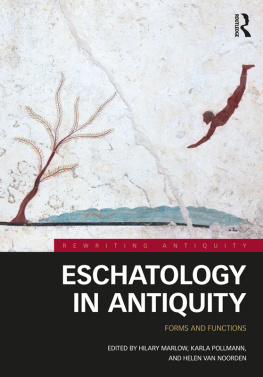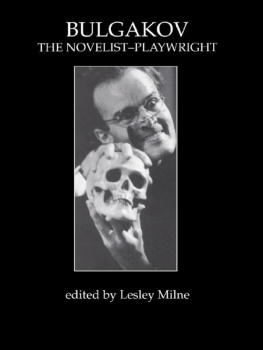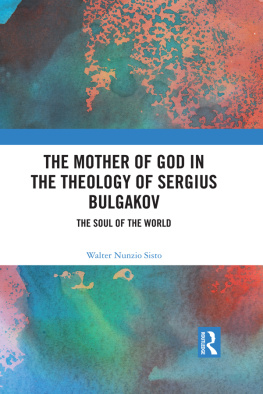The Sophiology of Death
Essays on Eschatology: Personal, Political, Universal
Sergius Bulgakov
Edited and translated by Roberto J. De La Noval
Foreword by David Bentley Hart
The Sophiology of Death
Essays on Eschatology: Personal, Political, Universal
Copyright 2021 Roberto J. De La Noval. All rights reserved. Except for brief quotations in critical publications or reviews, no part of this book may be reproduced in any manner without prior written permission from the publisher. Write: Permissions, Wipf and Stock Publishers, W. th Ave., Suite , Eugene, OR 97401 .
Cascade Books
An Imprint of Wipf and Stock Publishers
W. th Ave., Suite
Eugene, OR 97401
www.wipfandstock.com
paperback isbn: 978-1-5326-9965-8
hardcover isbn: 978-1-5326-9966-5
ebook isbn: 978-1-5326-9967-2
Cataloguing-in-Publication data:
Names: Bulgakov, Sergi, 18711944 , author. | De La Noval, Roberto J., translator | Hart, David Bentley, foreword writer.
Title: The sophiology of death : essays on eschatology : personal, political, universal / Sergius Bulgakov, translated by Roberto J. De La Noval, with a foreword by David Bentley Hart.
Description: Eugene, OR: Cascade Books, 2021 | Includes bibliographical references and index.
Identifiers: isbn 978-1-5326-9965-8 ( paperback ) | isbn 978-1-5326-9966-5 ( hardcover ) | isbn 978-1-5326-9967-2 ( ebook )
Subjects: LCSH: Bulgakov, Sergi, 18711944 | Eschatology | Orthodox Eastern ChurchDoctrines | RestorationismHistory of doctrines | Apokatastasis (The Greek word) | UniversalismHistory of doctrines | DeathReligious aspectsChristianity
Classification: BT821.3 B8513 2021 ( paperback ) | BT821.3 ( ebook )
02/09/21
Scripture quotations from The Authorized (King James) Version. Rights in the Authorized Version in the United Kingdom are vested in the Crown. Reproduced by permission of the Crowns patentee, Cambridge University Press.
Table of Contents
A fascinating collection of brilliant essaysmost previously untranslatedby this most remarkable and original of twentieth-century theologians, getting to the heart of the relationship between the created and the uncreated, between death and life. It is an indispensable resource, complementing the reading of Bulgakovs major works.
John Behr
University of Aberdeen and Vrije University
In this judicious selection of Bulgakovs eschatological essays, which traverse the speculative, political, pastoral, dogmatic, and personal, Roberto De La Noval offers Anglophone readers a true gift. His graceful translation retains throughout the urgency, force, and bright delicacy of Bulgakovs singular voice as the volume extends an invitationeven an imperative summonsto contemplate together the griefs and consolations of endings in history, time, and death.
Jennifer Newsome Martin
University of Notre Dame
A master of multiple sourcesphilosophical, theological, liturgical, scriptural, and patristicwhich he synthesizes in order to leave no theological stone unturned without a response, Sergius Bulgakov is the Aquinas of our time. Roberto J. De La Novals masterful translation of these essays further reinforces Bulgakovs genius and ongoing relevance for our contemporary questions.
Aristotle Papanikolaou
Fordham University
Bulgakovs essays on the Apocatastasis in this volume are not only gorgeous, learned, and stimulating, but very probably, and importantly, correct. His homily on the Dormition, while probably mistaken, is nonetheless essential reading for anyone who wants to think seriously about Mary. It is a delight to have the works collected here available in English: Roberto De La Noval deserves gratitude for his fine work in translating them; and Bulgakov deserves something approaching homage for having written them.
Paul J. Griffiths
Author of Regret: A Theology and Why Read Pascal?
Perhaps no twentieth-century theologian is quite as much in the ascent as Sergei Bulgakov. Not only does he represent a fundamental option for Eastern Orthodox theology, but he represents more broadly a model for a form of theological speculation, disciplined by the theological tradition, marked by a deep reading of Scripture, and with due recognition of the human fragility and failure, a theology grounded in the resurrection of Christ who will be all in all. This new volume of essays, beautifully translated by Roberto De La Noval, will only add to Bulgakovs high reputation. It will also remind readers that eschatology is not simply a theme in Bulgakovs writings, but at once its central energy and milieu. The collection shows once again the marvelous conjunction of theological imagination and fidelity to the tradition in the thought of Bulgakov, while sounding an indelible note of existential pathos without ever calling attention to the I.
Cyril ORegan
University of Notre Dame
There are authors who are not bound to their time. They speak from heart to heart, even from beyond the threshold of death. Father Sergius Bulgakov belongs to these witnesses of divine wisdom. For all those who discover with him the mystery of death, new perspectives of life as fellow-citizens with the saints, and of the household of God (Eph 2:19) will open up.
Barbara Hallensleben
University of Fribourg
To John and Ashley and Sonya and Brian, for making your homes outposts of heaven
Foreword
J ust two decades ago, the thought of Sergius Bulgakov was still a fairly recherch interest among Anglophone theologians. And even among the small number who had heard anything about it, none but a tiny minority were aware that its reputation as something exotic and wantonly hermetic was a silly caricature. For one thing, few of Bulgakovs books had appeared in English, and those that had were hardly exemplary of the extraordinary range, richness, originality, or sheer genius of his accomplishments (at best, they provided tantalizing hints of something splendid and mysterious, but inaccessible behind an opaque Cyrillic veil). Since then, however, and rather unexpectedly, a largely unorganized collective labor of translation has arisen, and grown from a steady trickle into a positive inundation. As a result, a great number of Christian scholars are only now coming to discover and appreciate one of the true titans of twentieth-century theologyarguably, in fact, the one whose thought achieved the most impressive balance between speculative audacity and logical precision. In the process, they are also discovering a thinker who speaks tobut from outside ofmost of the standard Western models of doctrinal, hermeneutical, and metaphysical theology, but who is also anything but a conventional representative of the Eastern models with which they are already familiar. In truth, this is perhaps the most delightfully unanticipated aspect of the late springtime that Bulgakovs thought is just now enjoying: his theology simply cannot be fitted easily into any of the more common genres of modern systematics.
On the one hand, Bulgakovs work was something of an anomaly in Orthodox thought. It was to a great degree shaped by the very special conditions of late nineteenth- and early twentieth-century Russian religious philosophy, a loosely affiliated movement that constituted the most brilliant and original development in Orthodox thought since the days of the Church fathers; and it was this tradition of which Bulgakovs mature theological writings were the last great flowering and synthesis. But, of course, even in the Orthodox world, this places him in a fairly rarefied class, inasmuch as that entire remarkable tradition was nearly extinguished by the rise and triumph of the neo-Palamite movement in Orthodox thought, which at its worst can become a kind of historically unrefined neo-patristic scholasticism that all too often strives to stifle any genuinely creative Orthodox theology, or any attempt at a dynamic engagement with modern thought.

